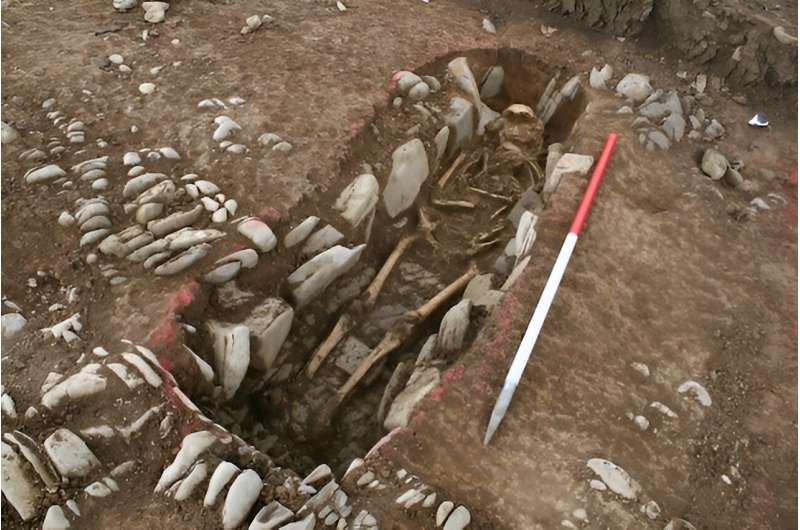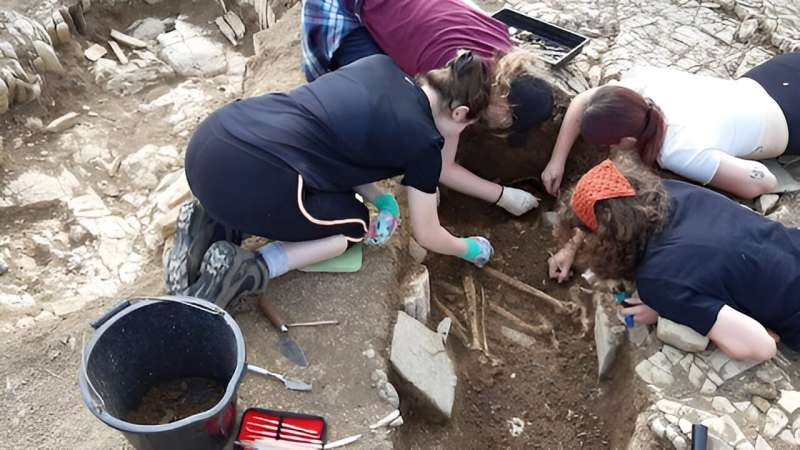This article has been reviewed according to Science X's editorial process and policies. Editors have highlighted the following attributes while ensuring the content's credibility:
fact-checked
trusted source
proofread
Evidence of ancient medieval feasting rituals uncovered in grounds of historic property

An early medieval cemetery has been discovered within the grounds of Fonmon Castle, near Barry, South Wales.
Archaeologists from Cardiff University's School of History, Archaeology and Religion carried out a dig in the summer, with further radiocarbon dating and analysis revealing the full extent of their find. The excavation offers fascinating new evidence about life in early medieval Wales (AD 400–1100) and transforms our understanding of the history of Fonmon and the Vale of Glamorgan.
Researchers believe the site was not just used for burial. They also recovered many fragments of animal bone, some displaying evidence for butchery and cooking, metal working debris, and fragments of rare imported glass drinking vessels. They think that some of this material could relate to grave-side feasting rituals.
It is thought that there may be as many as 80 graves, some of which display unusual features such as crouched body positions.
Dr. Andy Seaman, lecturer in early medieval archaeology, said, "This is a really exciting discovery. Sites of this date are extremely rare in Wales and often do not preserve bone and artifacts. The Fonmon cemetery will allow us to discover so much about the people who lived here around 1,400 years ago.
"Other similar sites have found bodies in crouched positions such as this, but considering the number of graves we have looked at so far, there seem to be a high proportion. This could be evidence of some sort of burial rite being carried out."
He added, "There is nothing to suggest that people were living near the site, so the evidence of cooking and glasses certainly suggests some level of ritual feasting, perhaps to celebrate or mourn the dead."

Geophysical surveys undertaken in the area during 2021 revealed a number of new archaeological sites, which the team have been investigating. They initially thought they had discovered an ancient farmstead, but more detailed excavations have revealed a cemetery containing burials dating to the sixth and seventh centuries AD.
The team's work is one of a number of Cardiff University projects which feature in an episode of BBC program Digging for Britain.
Nigel Ford, who purchased Fonmon Castle in 2019 said, "I am thrilled by this incredible discovery and find it fascinating. I can't wait to find out more about the people who used to live at Fonmon and believe that we can learn valuable lessons from the past."
The excavation will continue for several seasons and is being undertaken with the help of students and volunteers who receive archaeological training on the project.
Cardiff University archaeology student Jessica Morgan said, "I've worked at Fonmon for the last two summers, and it has been a fantastic experience. My time here has given me the valuable skills I need for a career in archaeology, expanded my knowledge about early medieval archaeology, and brought me closer to my Welsh heritage. It is such an important and fascinating site, and I can't wait for us to continue telling its story."
Fonmon Castle was built as a defensive keep and administration center in about 1180 AD. It was originally owned by the St John family, who were descended from Norman knights. It has had a colorful and varied history since then, opening as a visitor attraction to the public after the pandemic.
Provided by Cardiff University




















